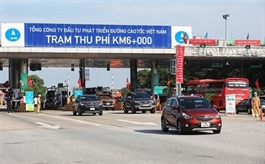Debt recovery methods to be cleaned up
Debt recovery methods to be cleaned up
Commercial banks in Vietnam are grappling with rising loans and regulatory gaps, especially concerning debt recovery and managing real estate collateral, and highlighting the urgent need for clearer guidance on land use and leasing.

During a government meeting last week, Do Minh Phu, chairman of TPBank, underscored one of the key issues facing banks: debt recovery. He said the expiration of Resolution No.42/2017/QH14 in 2023 has left banks without a formal mechanism to handle non-performing loans (NPLs), exacerbating the challenges in retrieving outstanding debts.
“The absence of clear regulations puts those involved in debt recovery at risk of unintentionally violating the law, which could potentially lead to criminal charges,” Phu said.
He called for immediate updates to legal frameworks to ensure that borrowers are held accountable for their debts and to resolve complications in collateral management. Phu also said there is a need to streamline protracted legal proceedings that are hampering banks’ ability to recover assets effectively. “Removing these barriers will significantly ease the challenges that banks currently face,” Phu added, urging the government to address the growing issues faced by the banking sector.
Pham Hong Hai, CEO of OCB, highlighted the urgent need for regulatory clarity, especially in managing secured real estate assets. He said the government and the State Bank of Vietnam (SBV) should establish a unified legal framework for collateral management, akin to the mechanisms provided under Resolution 42, which had allowed banks to recover debts more efficiently.
“The inconsistent enforcement of laws across regions makes it difficult for banks to handle collateral effectively, and the lack of clarity around secured assets has caused further complications in recovering debts,” Hai said.
Hai added the slow progress of real estate projects was largely due to policy bottlenecks that have yet to be resolved.
“Unblocking these hurdles will boost supply in the real estate market, stimulate investor confidence, and ultimately increase consumer demand,” he said. “The delay in resolving land pricing issues has prevented many businesses from fulfilling tax obligations, which in turn delays the issuance of land use certificates necessary for their operations.”
Dang Khac Vy, chairman of VIB, proposed that financial institutions should be given the authority to seize collateral assets, particularly when legally binding contracts provide for such an action. “Granting banks this legal power was essential for effective debt recovery. These provisions are crucial to address bad debts and ensure financial stability,” Vy said.
His concern stems from the expiration of Resolution 42 and the absence of provisions in the 2024 Credit Institutions Law regarding banks’ rights to seize collateral. He said that while financial institutions recognise the importance of collateral in debt recovery and reducing NPL ratios, they are currently operating in a legal void, with no formal structure to support their efforts.
Industry experts agree that clearer guidance is required for managing collateral, recovering debts, and reducing NPLs. The SBV aims to keep bad debt levels below 3 per cent in 2025. However, SBV Deputy Governor Pham Quang Dung said that by mid-September 2024, the NPL ratio had risen to 7.26 per cent, compared to 5.73 per cent at the end of 2023.
By the end of July 2024, the in-house NPL ratio of credit institutions had reached 4.75 per cent, up from 4.55 per cent at the end of 2023 and 2.03 per cent at the end of 2022. Dung said that in the private joint-stock commercial bank sector, NPL ratios stood at 7.77 per cent by the end of June 2024, reflecting a 4.8 per cent increase compared to the end of 2023.
Phu of TPBank also said that banks were eager for a pilot resolution that would allow commercial housing projects to be developed on land not classified as residential.
“If this resolution is passed, it will open up new opportunities for many real estate businesses whose projects, while not on residential land, align with urban planning and development strategies,” Phu said. “Recognising projects such as commercial developments with residential land status would ease the difficulties faced by real estate firms.”
Tran Hung Huy, chairman of ACB, noted that new land-related laws enacted in 2024 had introduced significant changes, many of which have positively impacted the real estate market.
“Clearer guidance is still needed for financial institutions, particularly in terms of accepting collateral on land leased for business purposes, where rental payments are made annually,” Huy said. “Article 37 of the 2024 Land Law allows for the transfer of land use rights but restricts collateralisation to assets owned and attached to the land, without clarifying the mortgage of leasehold rights.




























